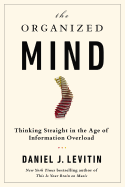
Given the constant barrage of information and the infinite distractions of technology, neuroscientist Daniel J. Levitin (This Is Your Brain on Music) says it's no wonder people regularly lose their keys or forget appointments. The flow of information isn't going to slow, so what's the solution? Understand your brain.
The human brain's natural tendency is to categorize and sort all incoming information--a tendency that served us well until the current information explosion. Now the brain takes in an overwhelming amount of data, experiences and knowledge and organizes it in such a way that memories are difficult to retrieve or are altered to the point of unreliability. To battle this phenomenon, Levitin says people need to move some of the brain's systems outside the body. He examines how these external systems can work to organize the human environment, everything from the physical (homes) to the theoretical (time).
The Organized Mind is packed with methods readers can immediately put into action, but it also contains concepts readers may struggle to accept. It calls into question the value of multitasking and challenges readers to make rational decisions about life-changing events, such as cancer surgery--situations where a rational choice seems obvious in theory but in practice emotions play a persuasive part. However, Levitin does an excellent job of showing different perspectives and driving home the idea that an organized mind can have more control over emotion because it has control over the information.
Anyone who's ever asked themselves, "Now, where'd I put those keys?" will likely find The Organized Mind an invaluable resource. --Jen Forbus of Jen's Book Thoughts

